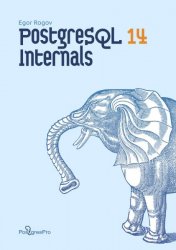 Название: PostgreSQL 14 Internals Название: PostgreSQL 14 Internals
Автор: Egor Rogov
Издательство: Postgres Professional
Год: 2023
Страниц: 629
Язык: английский
Формат: pdf (true)
Размер: 10.1 MB
This book is for those who will not settle for a black-box approach when working with a database. If you are eager to learn, prefer not to take expert advice for granted, and would like to figure out everything yourself, follow along. I assume that the reader has already tried using PostgreSQL and has at least some general understanding of how it works. Entry-level users may find the text a bit difficult. For example, I will not tell anything about how to install the server, enter psql commands, or set configuration parameters. I hope that the book will also be useful for those who are familiar with another database system, but switch over to PostgreSQL and would like to understand how they differ. A book like this would have saved me a lot of time several years ago. And that’s exactly why I finally wrote it.
In the introductory chapter, I briefly touch upon the main database concepts that will serve as the foundation for all the further narration. I do not expect you to get much new information from this chapter but still include it to complete the big picture. Besides, this overview can be found useful by those who are migrating from other database systems.
Part I is devoted to questions of data consistency and isolation. I first cover them from the user’s perspective (you will learn which isolation levels are available and what are the implications) and then dwell on their internals. For this purpose, I have to explain implementation details of multiversion concurrency control and snapshot isolation, paying special attention to cleanup of outdated row versions.
Part II describes buffer cache and WAL, which is used to restore data consistency after a failure.
Part III goes into details about the structure and usage of various types of locks: lightweight locks for RAM, heavyweight locks for relations, and row-level locks.
Part IV explains how the server plans and executes SQL queries. I will tell you which data access methods are available, which join methods can be used, and how the collected statistics are applied.
Part V extends the discussion of indexes from the already covered B-trees to other access methods. I will explain some general principles of extensibility that define the boundaries between the core of the indexing system, index access methods, and data types (which will bring us to the concept of operator classes), and then elaborate on each of the available methods.
Скачать PostgreSQL 14 Internals
|